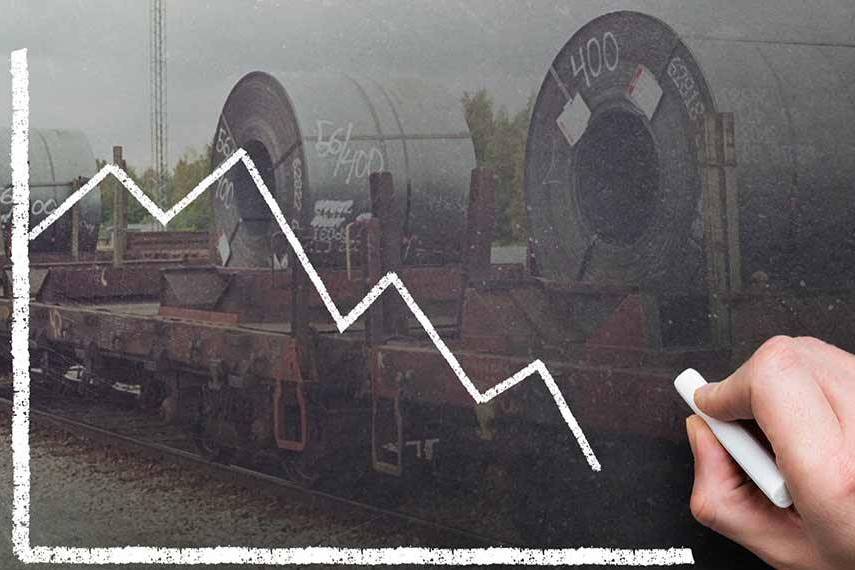Metallurgical cargoes switched to cars, Russian Railways lost 5 billion
01.05.2024
 An analysis of the situation over 3 years at one of the domestic metallurgical enterprises showed a fourfold increase in the shipment of finished products by road. In late 2021 – early 2022, the tariff policy for containers for the transportation of metallurgical goods was revised, tariffs were more than doubled, which led to a 50% decrease in traffic. The unit cost of container transportation has increased by 200%. The volume of motor transport has increased 4 times. "Before these events, the container strategy was adopted by the company, although there was an opportunity to invest, as an alternative, in specialized rolling stock. Against this background, there are no options left but to delve into trucking. Most importantly, this decision required investments in the infrastructure for road transportation at the enterprises of both shippers and customers. But in the case of SMEs receiving metallurgical cargoes, it is difficult to maintain the railway infrastructure in proper condition, and they were happy to switch to motor transport," says S. Tolstoukhov. And in some cases, the point of no return has already been reached. According to the expert, even if all tariff and infrastructure problems are solved now, many customers who have not invested in their railway infrastructure during this time will not be able to return to this transport.
An analysis of the situation over 3 years at one of the domestic metallurgical enterprises showed a fourfold increase in the shipment of finished products by road. In late 2021 – early 2022, the tariff policy for containers for the transportation of metallurgical goods was revised, tariffs were more than doubled, which led to a 50% decrease in traffic. The unit cost of container transportation has increased by 200%. The volume of motor transport has increased 4 times. "Before these events, the container strategy was adopted by the company, although there was an opportunity to invest, as an alternative, in specialized rolling stock. Against this background, there are no options left but to delve into trucking. Most importantly, this decision required investments in the infrastructure for road transportation at the enterprises of both shippers and customers. But in the case of SMEs receiving metallurgical cargoes, it is difficult to maintain the railway infrastructure in proper condition, and they were happy to switch to motor transport," says S. Tolstoukhov. And in some cases, the point of no return has already been reached. According to the expert, even if all tariff and infrastructure problems are solved now, many customers who have not invested in their railway infrastructure during this time will not be able to return to this transport.
 An analysis of the situation over 3 years at one of the domestic metallurgical enterprises showed a fourfold increase in the shipment of finished products by road. In late 2021 – early 2022, the tariff policy for containers for the transportation of metallurgical goods was revised, tariffs were more than doubled, which led to a 50% decrease in traffic. The unit cost of container transportation has increased by 200%. The volume of motor transport has increased 4 times. "Before these events, the container strategy was adopted by the company, although there was an opportunity to invest, as an alternative, in specialized rolling stock. Against this background, there are no options left but to delve into trucking. Most importantly, this decision required investments in the infrastructure for road transportation at the enterprises of both shippers and customers. But in the case of SMEs receiving metallurgical cargoes, it is difficult to maintain the railway infrastructure in proper condition, and they were happy to switch to motor transport," says S. Tolstoukhov. And in some cases, the point of no return has already been reached. According to the expert, even if all tariff and infrastructure problems are solved now, many customers who have not invested in their railway infrastructure during this time will not be able to return to this transport.
An analysis of the situation over 3 years at one of the domestic metallurgical enterprises showed a fourfold increase in the shipment of finished products by road. In late 2021 – early 2022, the tariff policy for containers for the transportation of metallurgical goods was revised, tariffs were more than doubled, which led to a 50% decrease in traffic. The unit cost of container transportation has increased by 200%. The volume of motor transport has increased 4 times. "Before these events, the container strategy was adopted by the company, although there was an opportunity to invest, as an alternative, in specialized rolling stock. Against this background, there are no options left but to delve into trucking. Most importantly, this decision required investments in the infrastructure for road transportation at the enterprises of both shippers and customers. But in the case of SMEs receiving metallurgical cargoes, it is difficult to maintain the railway infrastructure in proper condition, and they were happy to switch to motor transport," says S. Tolstoukhov. And in some cases, the point of no return has already been reached. According to the expert, even if all tariff and infrastructure problems are solved now, many customers who have not invested in their railway infrastructure during this time will not be able to return to this transport.